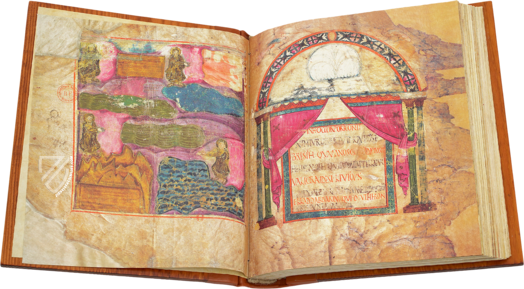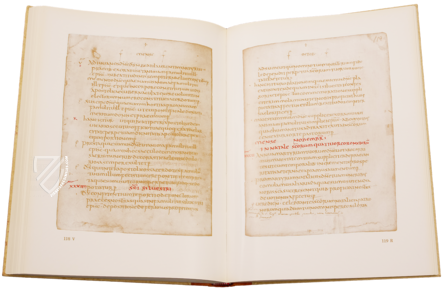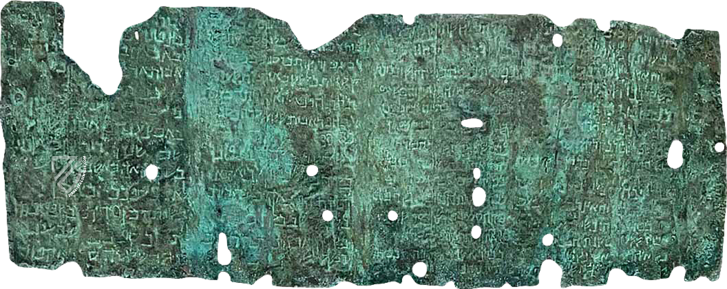Codex Vaticanus B
(3,000€ - 7,000€)
This codex is not only a precious remnant of Late Antiquity but is also one of the earliest and most important specimens of the complete Christian Bible. Created in the middle of the 4th century, likely in Constantinople, it was regarded as "the oldest extant copy of the Bible" before the discovery of the Dead Sea Scrolls in 1946/47. The text is written in uncial script without any spacing or punctuation and was likely created by a team of skilled artists. Various amendments and notations date were added over the centuries, and the text was partially restored by a masterful hand during the 15th century when it also came into the possession of the Vatican Library, where it remains today.
Codex Vaticanus B
One of the most important witnesses to the Greek text of the New Testament: the so-called Codex Vaticanus B. The most widely sold editions of the Greek New Testament are largely based on the 4th century text, which was regarded as "the oldest extant copy of the Bible" before the discovery of the Dead Sea Scrolls in 1946/47. Furthermore, it is one of the most beautiful examples of an uncial manuscript from Late Antiquity and encompasses both the Old and New testaments. Uncial is a majuscule script (written entirely in capital letters) commonly used by Latin and Greek scribes between the 4th to 8th centuries. Lacking any spacing or punctuation, uncial was gradually replaced by more easily read textual forms in the course of the Middle Ages.
A Gem of the Vatican Library
Although known under different shelf marks such as Vat. gr. 1209, no. B, or 03 Gregory-Aland δ 1 von Soden, this manuscript has safely resided in the Vatican Library since the 15th century, when it was partially restored, although it is still missing some original leaves. Various glosses, corrections, and additions to the text were made in successive centuries and suggest regular use of the Codex Vaticanus B throughout its existence. The text of both Testaments was partially restored by a masterful hand during the 15th century, and some of the texts for the New Testament have been separately stored under the shelf mark Codex 1957.
The Work of Many Hands
Research indicates that the Codex Vaticanus B is the work of at least three scribes who were possibly supervised by a pair of editors, although scholars have postulated various places of origin for the manuscript ranging from Rome to Alexandria to Caesarea Maritima, a city on the Mediterranean coast of modern Israel. Although this is still hotly contested among scholars, some believe these amendments were made in the course of the 10th or 11th centuries by an extremely talented scribe who used the fullness of his abilities to replicate the original text from Late Antiquity. The cursive writing that appears in the margins is believed to have been added during the 12th century. Nevertheless, the manuscript has signs of extensive and regular use over the centuries, but when and where is still up to debate.
Beautiful Uncial Text
Arranged in three columns, the lettering is tidy and without ornamentation, lacking any form of punctuation except for accents made on iotas and upsilons by later scholars. The codex was likely stored in Caesarea during the 6th century and shares stylistic similarities with the Codex Sinaiticus, especially with regard to the Book of Acts. Its existence was first acknowledged during the 16th century in the correspondence that occurred between Erasmus of Rotterdam and the prefects of the Vatican Library, Paulus Bombasius and Juan Ginés de Sepúlveda.
Codicology
- Alternative Titles
- Bibliorum sacrorum Graecorum Codex Vaticanus B
Codex Vaticanus Graecus 1209 - Size / Format
- 1554 pages / 27.0 × 27.0 cm
- Origin
- Turkey
- Date
- 4th century
- Epochs
- Style
- Genre
- Script
- Uncial
- Content
- Old and New Testament, additional Prolegomena volume
- Artist / School
- Two or three scribes
Codex Vaticanus B
In the Beginning…
A simple incipit with the opening lines of the Book of Genesis written in red ink is some of the only ornamentation found in this manuscript. The fact that it is so text-focused indicates that it was created for practical purposes, likely intended for theologians in libraries rather than being used for ceremonial use in cathedrals and processions. It is not written in majuscule, so we can assume that this portion of the text is among those that were restored or replaced during the Middle Ages.

Codex Vaticanus B
Text Page with Marginal Notes
The original text of the manuscript is written in Greek uncial, a majuscule script (written entirely in capital letters) commonly used by Latin and Greek scribes between the 4th to 8th centuries. It has the advantage of making an efficient use of the page, but lacks any spacing or punctuation, and thus was gradually replaced by more easily read scripts in the course of the Middle Ages.
The cursive writing that appears in the margins and even between the three columns of majuscule script is believed to have been added during the 12th century, although it is not known who made these elegant notes. Nonetheless, it is evidence of the regular and extensive use of the manuscript since it was first created twelve centuries ago.

#1 Bibliorum sacrorum Graecorum Codex Vaticanus B
Languages: English, French
(3,000€ - 7,000€)
- Treatises / Secular Books
- Apocalypses / Beatus
- Astronomy / Astrology
- Bestiaries
- Bibles / Gospels
- Chronicles / History / Law
- Geography / Maps
- Saints' Lives
- Islam / Oriental
- Judaism / Hebrew
- Single Leaf Collections
- Leonardo da Vinci
- Literature / Poetry
- Liturgical Manuscripts
- Medicine / Botany / Alchemy
- Music
- Mythology / Prophecies
- Psalters
- Other Religious Books
- Games / Hunting
- Private Devotion Books
- Other Genres
- Afghanistan
- Armenia
- Austria
- Belgium
- Belize
- Bosnia and Herzegovina
- China
- Colombia
- Costa Rica
- Croatia
- Cyprus
- Czech Republic
- Denmark
- Egypt
- El Salvador
- Ethiopia
- France
- Germany
- Greece
- Guatemala
- Honduras
- Hungary
- India
- Iran
- Iraq
- Israel
- Italy
- Japan
- Jordan
- Kazakhstan
- Kyrgyzstan
- Lebanon
- Liechtenstein
- Luxembourg
- Mexico
- Morocco
- Netherlands
- Palestine
- Panama
- Peru
- Poland
- Portugal
- Romania
- Russia
- Serbia
- Spain
- Sri Lanka
- Sweden
- Switzerland
- Syria
- Tajikistan
- Turkey
- Turkmenistan
- Ukraine
- United Kingdom
- United States
- Uzbekistan
- Vatican City
- A. Oosthoek, van Holkema & Warendorf
- Aboca Museum
- Ajuntament de Valencia
- Akademie Verlag
- Akademische Druck- u. Verlagsanstalt (ADEVA)
- Aldo Ausilio Editore - Bottega d’Erasmo
- Alecto Historical Editions
- Alkuin Verlag
- Almqvist & Wiksell
- Amilcare Pizzi
- Andreas & Andreas Verlagsbuchhandlung
- Archa 90
- Archiv Verlag
- Archivi Edizioni
- Arnold Verlag
- ARS
- Ars Magna
- ArtCodex
- AyN Ediciones
- Azimuth Editions
- Badenia Verlag
- Bärenreiter-Verlag
- Belser Verlag
- Belser Verlag / WK Wertkontor
- Benziger Verlag
- Bernardinum Wydawnictwo
- BiblioGemma
- Biblioteca Apostolica Vaticana (Vaticanstadt, Vaticanstadt)
- Bibliotheca Palatina Faksimile Verlag
- Bibliotheca Rara
- Boydell & Brewer
- Bramante Edizioni
- Bredius Genootschap
- Brepols Publishers
- British Library
- C. Weckesser
- Caixa Catalunya
- Canesi
- CAPSA, Ars Scriptoria
- Caratzas Brothers, Publishers
- Carus Verlag
- Casamassima Libri
- Centrum Cartographie Verlag GmbH
- Chavane Verlag
- Christian Brandstätter Verlag
- Circulo Cientifico
- Club Bibliófilo Versol
- Club du Livre
- CM Editores
- Collegium Graphicum
- Collezione Apocrifa Da Vinci
- Comissão Nacional para as Comemorações dos Descobrimentos Portugueses
- Coron Verlag
- Corvina
- CTHS
- D. S. Brewer
- Damon
- De Agostini/UTET
- De Nederlandsche Boekhandel
- De Schutter
- Deuschle & Stemmle
- Deutscher Verlag für Kunstwissenschaft
- DIAMM
- Droz
- E. Schreiber Graphische Kunstanstalten
- Ediciones Boreal
- Ediciones Grial
- Ediclube
- Edições Inapa
- Edilan
- Editalia
- Edition Deuschle
- Edition Georg Popp
- Edition Leipzig
- Edition Libri Illustri
- Editiones Reales Sitios S. L.
- Éditions de l'Oiseau Lyre
- Editions Medicina Rara
- Editorial Casariego
- Editorial Mintzoa
- Editrice Antenore
- Editrice Velar
- Edizioni Edison
- Egeria, S.L.
- Eikon Editores
- Electa
- Emery Walker Limited
- Enciclopèdia Catalana
- Eos-Verlag
- Ephesus Publishing
- Ernst Battenberg
- Eugrammia Press
- Extraordinary Editions
- Fackelverlag
- Facsimila Art & Edition
- Facsimile Editions Ltd.
- Facsimilia Art & Edition Ebert KG
- Faksimile Verlag
- Feuermann Verlag
- Folger Shakespeare Library
- Franco Cosimo Panini Editore
- Friedrich Wittig Verlag
- Fundación Hullera Vasco-Leonesa
- G. Braziller
- Gabriele Mazzotta Editore
- Gebr. Mann Verlag
- Gesellschaft für graphische Industrie
- Getty Research Institute
- Giovanni Domenico de Rossi
- Giunti Editore
- Graffiti
- Grafica European Center of Fine Arts
- Guido Pressler
- Guillermo Blazquez
- Gustav Kiepenheuer
- H. N. Abrams
- Harrassowitz
- Harvard University Press
- Helikon
- Hendrickson Publishers
- Henning Oppermann
- Herder Verlag
- Hes & De Graaf Publishers
- Hoepli
- Holbein-Verlag
- Houghton Library
- Hugo Schmidt Verlag
- Idion Verlag
- Il Bulino, edizioni d'arte
- ILte
- Imago
- Insel Verlag
- Insel-Verlag Anton Kippenberger
- Instituto de Estudios Altoaragoneses
- Instituto Nacional de Antropología e Historia
- Introligatornia Budnik Jerzy
- Istituto dell'Enciclopedia Italiana - Treccani
- Istituto Ellenico di Studi Bizantini e Postbizantini
- Istituto Geografico De Agostini
- Istituto Poligrafico e Zecca dello Stato
- Italarte Art Establishments
- Jan Thorbecke Verlag
- Johnson Reprint Corporation
- Josef Stocker
- Josef Stocker-Schmid
- Jugoslavija
- Karl W. Hiersemann
- Kasper Straube
- Kaydeda Ediciones
- Kindler Verlag / Coron Verlag
- Kodansha International Ltd.
- Konrad Kölbl Verlag
- Kurt Wolff Verlag
- La Liberia dello Stato
- La Linea Editrice
- La Meta Editore
- Lambert Schneider
- Landeskreditbank Baden-Württemberg
- Leo S. Olschki
- Les Incunables
- Liber Artis
- Library of Congress
- Libreria Musicale Italiana
- Lichtdruck
- Lito Immagine Editore
- Lumen Artis
- Lund Humphries
- M. Moleiro Editor
- Maison des Sciences de l'homme et de la société de Poitiers
- Manuscriptum
- Martinus Nijhoff
- Maruzen-Yushodo Co. Ltd.
- MASA
- Massada Publishers
- McGraw-Hill
- Metropolitan Museum of Art
- Militos
- Millennium Liber
- Müller & Schindler
- Nahar - Stavit
- Nahar and Steimatzky
- National Library of Wales
- Neri Pozza
- Nova Charta
- Oceanum Verlag
- Odeon
- Orbis Mediaevalis
- Orbis Pictus
- Österreichische Staatsdruckerei
- Oxford University Press
- Pageant Books
- Parzellers Buchverlag
- Patrimonio Ediciones
- Pattloch Verlag
- PIAF
- Pieper Verlag
- Plon-Nourrit et cie
- Poligrafiche Bolis
- Presses Universitaires de Strasbourg
- Prestel Verlag
- Princeton University Press
- Prisma Verlag
- Priuli & Verlucca, editori
- Pro Sport Verlag
- Propyläen Verlag
- Pytheas Books
- Quaternio Verlag Luzern
- Reales Sitios
- Recht-Verlag
- Reichert Verlag
- Reichsdruckerei
- Reprint Verlag
- Riehn & Reusch
- Roberto Vattori Editore
- Rosenkilde and Bagger
- Roxburghe Club
- Salerno Editrice
- Saltellus Press
- Sandoz
- Sarajevo Svjetlost
- Schöck ArtPrint Kft.
- Schulsinger Brothers
- Scolar Press
- Scrinium
- Scripta Maneant
- Scriptorium
- Shazar
- Siloé, arte y bibliofilia
- SISMEL - Edizioni del Galluzzo
- Sociedad Mexicana de Antropología
- Société des Bibliophiles & Iconophiles de Belgique
- Soncin Publishing
- Sorli Ediciones
- Stainer and Bell
- Studer
- Styria Verlag
- Sumptibus Pragopress
- Szegedi Tudomànyegyetem
- Taberna Libraria
- Tarshish Books
- Taschen
- Tempus Libri
- Testimonio Compañía Editorial
- Thames and Hudson
- The Clear Vue Publishing Partnership Limited
- The Facsimile Codex
- The Folio Society
- The Marquess of Normanby
- The Richard III and Yorkist History Trust
- Tip.Le.Co
- TouchArt
- TREC Publishing House
- TRI Publishing Co.
- Trident Editore
- Tuliba Collection
- Typis Regiae Officinae Polygraphicae
- Union Verlag Berlin
- Universidad de Granada
- University of California Press
- University of Chicago Press
- Urs Graf
- Vallecchi
- Van Wijnen
- VCH, Acta Humaniora
- VDI Verlag
- VEB Deutscher Verlag für Musik
- Verlag Anton Pustet / Andreas Verlag
- Verlag Bibliophile Drucke Josef Stocker
- Verlag der Münchner Drucke
- Verlag für Regionalgeschichte
- Verlag Styria
- Vicent Garcia Editores
- W. Turnowski Ltd.
- W. Turnowsky
- Waanders Printers
- Wiener Mechitharisten-Congregation (Wien, Österreich)
- Wissenschaftliche Buchgesellschaft
- Wissenschaftliche Verlagsgesellschaft
- Wydawnictwo Dolnoslaskie
- Xuntanza Editorial
- Zakład Narodowy
- Zollikofer AG































































